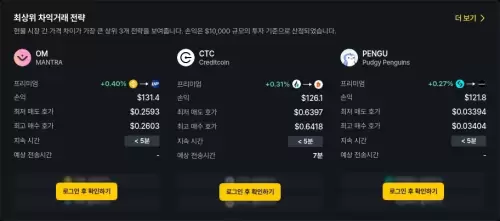 |
|
 |
|
 |
|
 |
|
 |
|
 |
|
 |
|
 |
|
 |
|
 |
|
 |
|
 |
|
 |
|
 |
|
 |
|
Cryptocurrency News Articles
South Korea's Crypto Market Kicked Off 2025 with Political Chaos, Regulatory Heat and New Records
Apr 18, 2025 at 11:20 pm
South Korea kicked off 2025 with political chaos, regulatory heat and a crypto market finally brought to heel — or at least forced to grow up.

South Korea kicked off 2025 with political chaos, regulatory heat and a crypto market finally brought to heel – or at least forced to grow up.
The nation closed 2024 in disarray following then-President Yoon Suk Yeol’s botched martial law stunt in December.
In the aftermath, authorities spent the first quarter drawing lines in the sand as financial watchdogs slapped cryptocurrency exchanges with probes and lifted the ban on corporate trading accounts. Meanwhile, crypto adoption hit record highs as trading volume cooled.
Here’s a breakdown of the key developments that shaped South Korea’s crypto sector in Q1 of 2025.
South Korean crypto traders given yet another two-year tax exemption
Jan. 1 – Crypto tax postponed
A planned 20% capital gains tax on crypto did not take effect on Jan. 1 after lawmakers agreed to delay it until 2027. This was the third postponement: first from 2022 to 2023, then again to 2025.
The latest delay, reached through bipartisan consensus in late 2024, came amid mounting economic uncertainty and political turmoil.
Lawmakers cited fears of investor flight to offshore exchanges, challenges in tracking wallet-based profits, and shifting national priorities in the wake of Yoon’s failed martial law stunt and subsequent impeachment.
Jan. 14 – US, Japan, Korea warn firms on Lazarus
The US, Japan and South Korea published a joint statement on North Korean crypto hacks. Crypto firms were warned to beware of malware and fake IT freelancers.
Lazarus Group, the state-sponsored cyber threat group, is a prime suspect in some of the biggest crypto heists, including the $230 million theft from Indian exchange WazirX and the $50 million breach of Upbit, South Korea’s largest exchange.
Jan. 15 – Companies await greenlight for crypto trading
The Virtual Asset Committee, a crypto policy coordination body, held its second meeting. The Financial Services Commission (FSC) was widely expected to finally approve corporate access to trading accounts on local exchanges.
Despite popular demand, the FSC ultimately held off on making an official decision, citing a need for further review.
Instead, the FSC announced plans to strengthen investor protections against price manipulation and introduce stricter regulations for stablecoins.
Jan. 16 – First prosecution for crypto market manipulation
Authorities indicted a trader in the first pump-and-dump case prosecuted under the Virtual Asset User Protection Act, the new crypto law that took effect in July 2024.
Also, Upbit received a suspension notice for allegedly breaching Know Your Customer (KYC) requirements in over 500,000 instances, prompting regulators to consider banning the exchange from registering new users.
Jan. 23 – Upbit, Bithumb to compensate users after service outages during martial law
Upbit and rival exchange Bithumb announced plans to compensate users following service disruptions triggered by the surprise declaration of nationwide martial law on Dec. 3, 2024.
The shocking move caused panic across financial and crypto markets, leading to a surge in traffic that overwhelmed local trading platforms.
South Korean crypto world finally opened to corporations
Feb. 13 – Charities and universities to get first dibs on corporate crypto access
The FSC unveiled its long-awaited plan to allow corporate entities to open crypto trading accounts in phases by late 2025.
The rollout will require businesses to use “real-name” accounts and comply with Know Your Customer (KYC) and Anti-Money Laundering (AML) regulations. Charities and universities are first in line and will be allowed to sell their crypto donations starting in the first half of the year.
South Korea’s real-name financial transaction system, introduced in 1993, was designed to combat tax evasion and money laundering by requiring all bank accounts to be opened under verified legal names using national IDs.
Crypto trading exploded in 2017, part-fueled by anonymous accounts from businesses, foreigners and minors. Financial authorities responded by requiring crypto exchanges to partner with domestic banks and offer fiat services only through verified real-name accounts. To date, only five exchanges have met the requirements.
Since there was no regulatory framework for real-name corporate accounts, this policy effectively shut out both overseas users and domestic companies from trading on South Korean exchanges. The new roadmap aims to fix that by creating a formal structure for institutional participation under tighter compliance standards.
Feb. 21 – Alleged serial fraudster busted again
Police again arrested “Jon Bur Kim,” identified by the surname Park, for allegedly profiting 68 billion won (around $48 million) in a crypto scam.
The case involved the token Artube (ATT), which was allegedly used by Park to carry
Disclaimer:info@kdj.com
The information provided is not trading advice. kdj.com does not assume any responsibility for any investments made based on the information provided in this article. Cryptocurrencies are highly volatile and it is highly recommended that you invest with caution after thorough research!
If you believe that the content used on this website infringes your copyright, please contact us immediately (info@kdj.com) and we will delete it promptly.
-

-

-

- Token Chart Buzz: Analysts Eye Potential Price Increase with Mutuum Finance (MUTM)
- Aug 03, 2025 at 06:00 pm
- Analysts are buzzing about Mutuum Finance (MUTM), a DeFi player showing potential for a price increase. Is it the next 100x gem? Let's dive into the token chart and the reasons behind the optimism.
-

-

-

-

-

-






























































